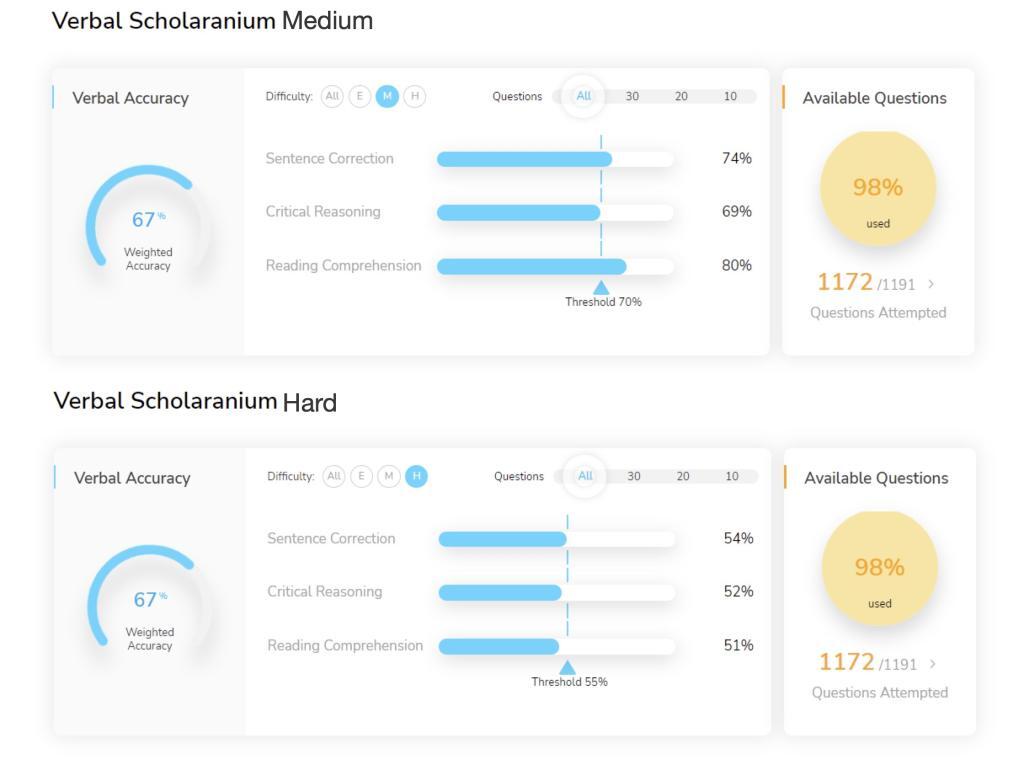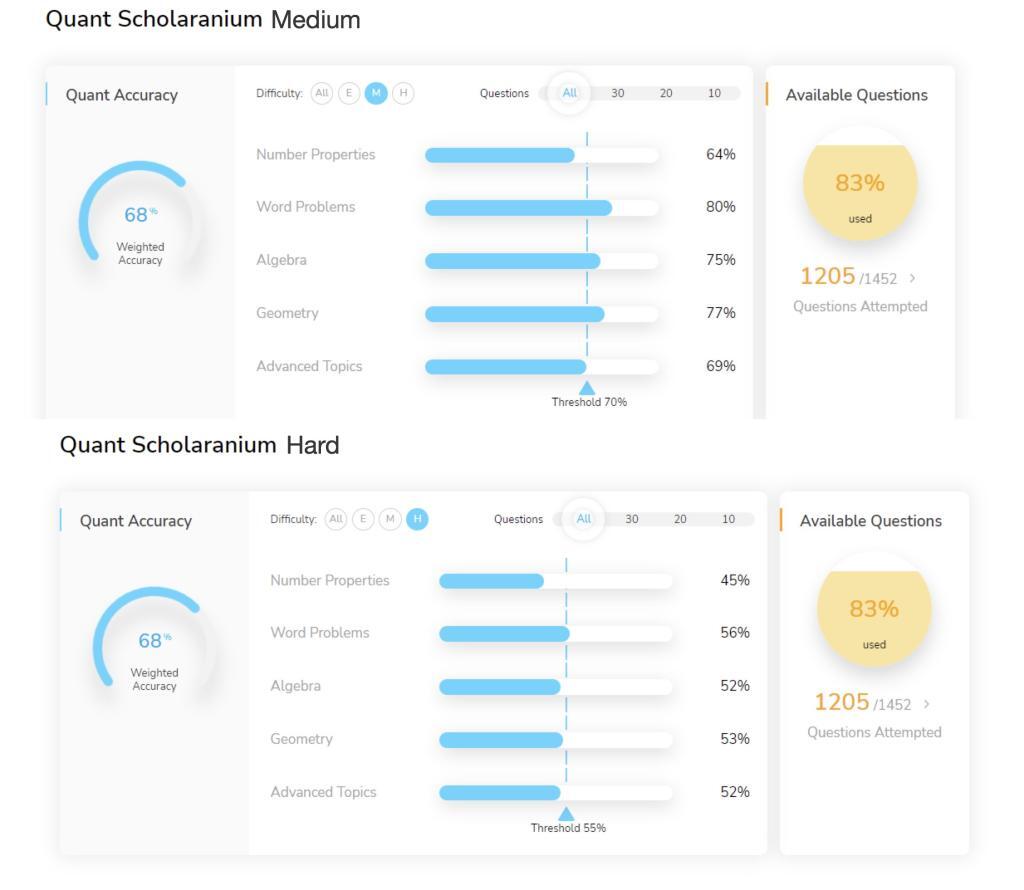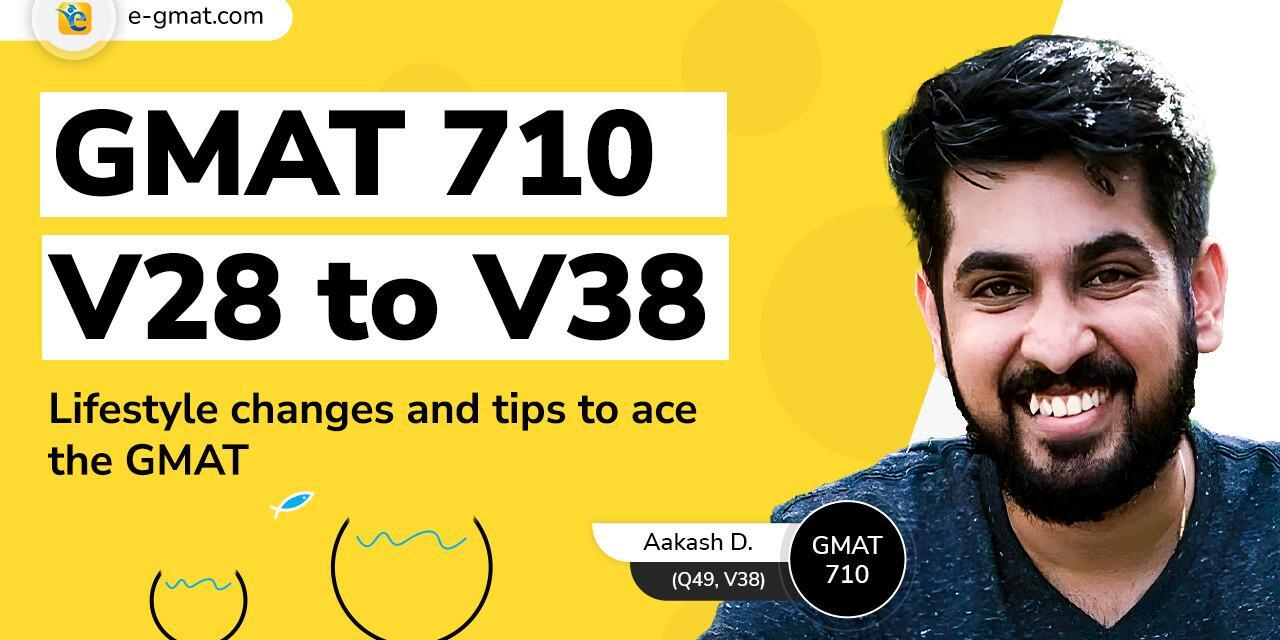Habit is the intersection of knowledge (what to do), skill (how to do it), and desire (the want to succeed).
After staying stuck in the 600s During his first two GMAT attempts, Aakash changed his lifestyle habits and study methods significantly to ensure he met his target GMAT score.
Read this article to know about the 7 steps that can help you score 700+ on the GMAT
He identified the causes of his failure in his first two attempts and found a platform that could help him structure his studies., He focused all his energy on his GMAT preparation.
While he picked every critical concept and method taught during the course, Aakash also worked rigorously on improving his knowledge, skills, and habits. This helped him cross the 700+ barrier that he was so determined to cross.
Watch the video on his journey from V28 to V38 where he explains how making some essential strategic course corrections and a few critical changes in everyday life can impact the learning curve and performance in the GMAT test significantly.
Rajat: Welcome to this debriefing session, and congratulations on scoring 710. How does it feel?
Aakash: It feels great. Thanks for having me. I’ve been a great follower of e-GMAT. I began with e-GMAT by referring to YouTube videos which also came in handy during the actual GMAT prep.
First two attempts at GMAT and learnings
Rajat: GMAT 710 was your third attempt. You prepared for the GMAT twice before and scored 650 and 680. How did you prepare during that time? Why did you decide to go for the e-GMAT?
Aakash: Initially, when I started preparing, it was unstructured and haphazard. I was referring to multiple materials. However, it helped me create a foundation in terms of content and knowledge. When I got a 650, I realized that not having a structure in place was holding me back.
If you’re planning your GMAT retake, read this article to learn about the 5-step strategy that can help you achieve your target score.
Rajat: Explain not having a structure in place.
Aakash: It’s when you keep referring to the OG and random material on the internet. You solve whatever you get, but don’t return and learn what you’ve missed. That was the primary thing I felt was missing from my preparation.
Rajat: How long did you prepare before you took the GMAT 650 attempt?
Aakash: I started my preparation in March and took the exam in May. So around two and a half months of preparation. The first attempt was stressful; I was not as prepared as I thought. I realized how my strengths and weaknesses were playing on the actual test day.
During the actual GMAT exam, I realized that my preparation was unstructured. There should be a methodical approach to studying and the exam.
I learned about e-GMAT from my peers and reviews on the internet stating that e-GMAT was one of the best courses available. Before enrolling for the course, I went through the e-GMAT guide and got in touch with one of the members of the e-GMAT team. He helped me understand the structure of the course and the various concepts it teaches.
Immediately within a week of preparing with e-GMAT, I started to see my score ticker moving along. My mock scores improved, especially in the verbal section, which was my main improvement area. I credit my success to e-GMAT and its course structure.
Immediately within a week of preparing with e-GMAT, I started to see my score ticker moving along. My mock scores improved, especially in the verbal section, which was my main improvement area. I credit my success to e-GMAT and its course structure.
Rajat: What were your quant and verbal scores on your first attempt?
Aakash: In my first attempt, I scored Q46 and V32, which improved to Q49 and V38, respectively, in the last one.
Verbal preparation with e-GMAT
Rajat: That’s good; V32 to V38 is a significant improvement. When you started using the e-GMAT platform, what sequence did you go with?
Aakash: I intended to attack verbal right away. I was comfortable with RC because I like reading books.
Sentence Correction and Critical Reasoning were the pieces where I knew I had to improve.
The way the course is structured is excellent. The course starts with building concepts and gradually builds up the ability before you begin solving more challenging questions. The eventual progression really helped.
Want to score a 99%ile score in the GMAT (760+)? A winning GMAT strategy ensures you hit your target GMAT Score. Attend our GMAT strategy session webinar and get started with developing your GMAT Strategy for a high GMAT score.
Sentence Correction is also a very well-organized section. It’s broken down into various sub-sections and covers subject-verb agreement, pronouns, and other topics. First, you focus on concepts in silos, and then at the end of the course, you attack them altogether.

Learning Methods to improve in CR and SC
Rajat: Before using the CR course, what was your approach to solving CR questions?
Aakash: The only approach I had was to try and think my way out of the problem statement, which included the lengthy hardcore way of solving a problem. It does not work on GMAT. The exam doesn’t test how much you understand. It tests how much you’re able to solve with what you know.
The pre-thinking method came in handy for CR, and It’s a very methodical approach. The first step is breaking down the construct of the premise and understanding the actual conclusion, which is a big issue for many students taking the GMAT. Once you identify the definite conclusion, you attack the premise and weaken or strengthen the reasoning. This approach helped.
Read this article to learn How to prethink assumptions in GMAT Critical Reasoning
Rajat: So that methodical approach, focusing one step at a time, conquering it, and moving forward, helped you improve verbal. How did the same change in Sentence correction?
Aakash: As I mentioned earlier, I never knew Sentence Correction had so many elements. I knew the basic ones. But there are a lot of approaches that e-GMAT describes in a very peculiar manner.
I never knew Sentence Correction had so many elements. I knew the basic ones. But there are a lot of approaches that e-GMAT describes in a very peculiar manner.
There are modules and sub-sections detailing all these methodologies. For example, if you break a modifier into two parts, which splits how you look at a question stem, you can identify to the minutest level how a sentence is wrong, how to rectify it, or how it changes the meaning. For questions of 700 and above, even the slightest word misplaced can affect the meaning altogether. That’s where I found myself to be improving. I think that’s one of the parameters which helped me push my score beyond the 700 mark.
SC prep with OG Vs e-GMAT
Rajat: For your first attempt, did you go through any books for SC prep?
Aakash: No, I didn’t. I stuck to the OGs. Even though OG is very comprehensive, I felt the need for something more than OG to crack the 700+ score.
Rajat: Yeah. OG tells you what GMAT tests. It doesn’t help build that understanding. In fact, I’ve even spoken with people at the GMAC about the level of detail.
I don’t know if you have the OG 2020 or OG beyond that. Those actually at least give you a reasonable degree of explanation as to what’s being tested. But between OG 2011 to OG 2019, the explanations and content were minimalistic.
Read this article to learn about OG 2022, its new enhancements and decide if you should buy it? GMAT Official Guide 2022 reviewed – OG 2022 vs. OG 2021
Aakash: Even explanations of the answers are very generic in nature. It does not point out specific mistakes in the explanations.
Rajat: Perhaps the people who wrote the explanation are not the same ones who created the questions. It probably could be the reason why it differs from ours. There are times when explanations don’t make sense, and this is where we put a lot of effort into our Official Guide solutions, too, not just in the e-GMAT solutions.
Did you ever reach out to the support team during your preparation?
Aakash: Yeah, I did. Within the course, there is an option where you can ask the experts if you have any queries while solving questions. All your queries immediately get reverted within the next 8-10 hours. It is a really interactive course that allows you to have two-way communication, whether via call or on the platform itself.

Lifestyle changes while preparing for GMAT
If you were to say three things to your fellow test takers regarding how they should think about their preparation or three best practices to get a good score on the GMAT, what’d those be?
Aakash: First and foremost, identify whether you are a morning person or an afternoon person; accordingly, select the slot for your exam. I am a morning person. And my job does not allow me to study in the evening. So, I made it a habit for two months to wake up at 5 AM and study. And then whenever I gave my mocks, I used to give it at 8 AM because that was my test slot. I ensure that my mindset at 8:00 AM is GMAT prep.
The second would be a significant focus on diet. I recall my first attempt; I felt very hungry after finishing the quant section. My focus deviated, and I messed up the verbal section.
And third, you know, you’ve put in a lot of effort over the last few months to prepare for the GMAT, be confident. The exam not only tests you on how capable you are at applying whatever you’ve learned but also tests your mental strength. GMAT always rewards hard work. It’s a very fair exam.
Read this article to get GMAT test day tips, best practices, and strategies that will help you ensure a hiccup-free GMAT – Checklist for the D Day
Rajat: You’ve mentioned unique points and explained each one well. I want to go a bit deeper on the first couple of them. You said you’re a morning person, and that’s when you also chose to take the test. You said you woke up at five in the morning. What was your study slot like?
Aakash: I’d study from 5 AM to 8 AM. On the weekends, I had reserved 8 AM to 11 AM for mocks or custom quizzes, the slot when I had my actual exam.
Over the period, I kept leveling up on the difficulty of questions. I started with the low-difficulty questions, moved on to medium, and then to hard ones. I ensured not to miss out on any questions.
Rajat: What adjustments did you have to make as to when to sleep for you to wake up at 5:00 AM? How did you ensure that you slept early and did not upset people around you?
Aakash: To wake up at 5 AM, I’d prepare the day before, wind up my work early, spend some time with the family, relax and sleep early. Luckily, my family knew how dedicated I was to GMAT. They were pretty supportive. I had standard Indian working time from 9 AM to 6/7 PM. Around 7:00 PM, I’d start winding up my work and dinner by 8:30–9 PM. Spend an hour with the family. Around 10 PM, I’d switch off devices and sleep.
After waking up in the morning, I ensured that I spent at least five minutes introspecting regarding what I wanted to do that day and what I did the day before. I’d spend another five minutes meditating and preparing myself for the day.
Rajat: What changes did you make to your diet so that you didn’t feel hungry during the exam?
Aakash: A lot of changes. I researched this. Being satiated on the day that you have your exam is what you should focus on. A high protein and clean diet are what I would recommend for everyone. You don’t need anything fancy; home-cooked food is more than enough.
Indian diet is very clean. You may additionally need to add some supplements such as dry fruits, walnuts, and almonds which are rich in omega3. These help your brain function better and focus. It would be best if you did this over an extended time.
Avoid doing this one week before the exam because your body needs to adjust to those additional nutrients; start all this perhaps a couple of months prior. You will see the results on exam day when it gets adjusted to the nutrients. You need to sync your brain and body with what you eat.

I like working out and ensured that even if I had to cram a workout into my daily activities. I’d do that by 7–7:30 PM, so I don’t miss out on waking up at 5 AM.
Rajat: That makes a lot of sense. Because of these changes on the second attempt, you did not feel the need to eat during the test. You felt mentally at peace during the exam. Is that correct?
Aakash: My wife says that the way to your heart and your mind is through your stomach. She ensured that I was prepared, unlike the first attempt.
Guidance for MBA applications and path forward
Rajat: So, you are now applying to IIM as well as ISB. And you’ve already had interviews with IIM A and C, as you mentioned earlier. Hopefully, you will get shortlisted for ISB as well. 710 is a good score, and your background is relevant. You want to stay in India and make an impact here. So definitely they will consider it.
Aakash: If I get shortlisted for ISB, could you help me restructure my pitch for the interviewers?
Rajat: We don’t offer that service, but our partner company called ISB Mantra offers an interview service. They also provide an admission guarantee; if you aren’t selected in ISB, they refund 50% of the money. As an e-GMAT student, you also save 25% on their package.
Click here to visit the ISB Mantra website to know about the services.
Aakash: That’d be great. I’d reach out to them to understand the package. Also, I’d like you to pass on my thanks to Payal. A lot of modules in the verbal section have her voice. I made it a habit of breaking down sentences that I’m reading in Payal’s voice. It was beneficial.
Rajat: I’ll surely pass your message on to her.
So, as you’re planning to work in the finance industry, especially in tier-two cities, it is a very noble goal. It is going to have a significant impact. Good luck. I hope you get into one of your top choices. Stay in touch.
Aakash: Thank you so much. And thanks to e-GMAT for helping me structure my approach for the GMAT exam.















